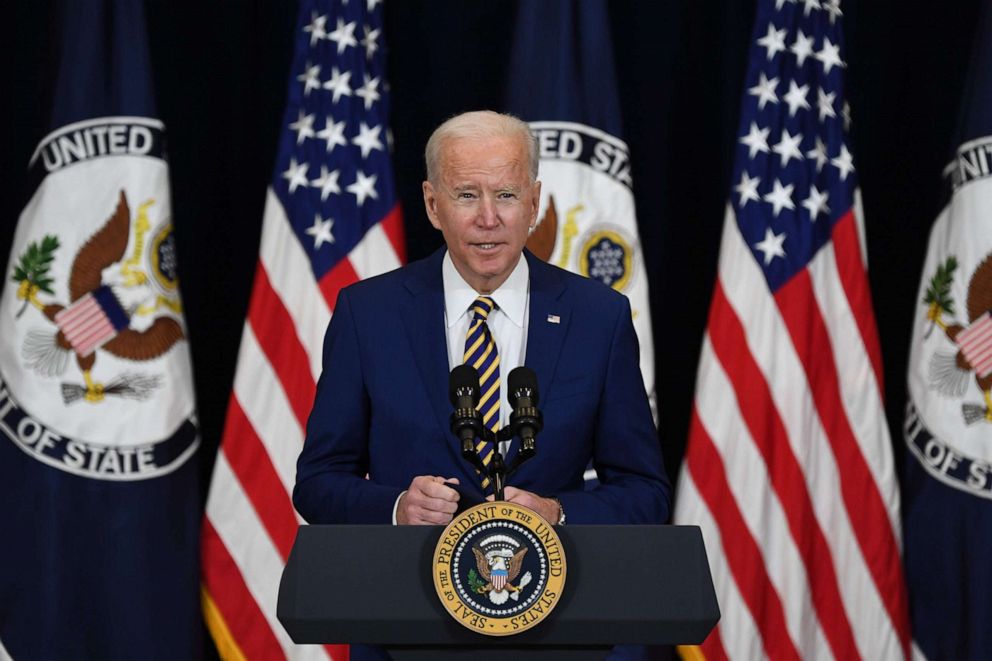
The facilities were used by Iranian-linked Iraqi militias, including Kataib Hezbollah and Kataib Sayyid al-Shuhada, he said.
The operation follows a deadly attack on a location housing U.S. personnel in Iraq that American officials have attributed to Iranian-linked groups. Earlier this month, rocket fire in northern Iraq killed a contractor working with the U.S. military and injured a U.S. service member.
“President Biden will act to protect American and coalition personnel,” Kirby said in a statement. “We have acted in a deliberate manner that aims to de-escalate the overall situation in both eastern Syria and Iraq.”
Defense Secretary Lloyd Austin told reporters Thursday that he was confident the building targeted in Syria was used by the militia responsible for recent attacks.
“It was my recommendation. We’ve said a number of times, we will respond on our timeline. And, once again [we] wanted to be sure of the connectivity and that we had the right targets,” he said, according to Military Times.
The White House did not issue a statement or otherwise acknowledge the strike.
A U.S. official, speaking on the condition of anonymity to provide additional details, said the single strike targeted a cluster of buildings along Syria’s eastern border and was believed to have killed up to a handful of people.
The attack comes as President Joe Biden attempts to open a diplomatic door to Iran. Biden has agreed to European-led talks with Iran about the future of the 2015 international nuclear deal that President Donald Trump renounced.
Iran has appeared to rebuff Biden’s initial efforts to resume diplomacy, and for now the United States remains outside the agreement. The airstrike appears to be part of a U.S. message to Iran that it cannot improve its leverage in talks by attacking U.S. interests. But Biden’s decision to use force may also set back his plan to shift the focus of U.S. national security away from the Middle East in a long-planned pivot to Asia.
“The strike, the way I see it, was meant to set the tone with Tehran and dent its inflated confidence ahead of negotiations,” said Bilal Saab, a former Pentagon official who is currently a senior fellow with the Middle East Institute. “You don’t want to enter into potential talks with Iran on any issue with a bruise to your face from the Irbil attacks.”
Rep. Michael McCaul, R-Texas, a member of the House Foreign Affairs Committee who has called for retaliatory strikes on Iranian-backed militias, welcomed the attack.
“Responses like this are a necessary deterrent and remind Iran, its proxies, and our adversaries around the world that attacks on U.S. interests will not be tolerated,” he said in a statement.
Other Republicans, including Sen. Marco Rubio, R-Fla., described the strike as “targeted, proportional and necessary.”
The operation follows intense U.S.-Iranian hostilities during the Trump administration, which identified weakening Iran’s leadership as a top foreign policy priority. In January 2020, the military launched a strike killing a senior Iranian military figure, Qasem Soleimani, in Baghdad. In response, Iran launched a major missile attack on a base housing U.S. troops in Iraq.
Some experts said the airstrike on Thursday signals a strategic middle ground that avoids further diplomatic strains with the Iraqi government, which assists the United States in the fight against the Islamic State and could view a strike in Iraq as a violation of its sovereignty.
Mick Mulroy, who served as a top Pentagon official for the Middle East during the Trump administration and is now an analyst with ABC News, said the strike was probably “calculated and scaled to avoid an escalation and send a message that Iran’s use of militias as proxies will not allow them to avoid responsibility.”
SITE Intelligence Group reported that a pro-Shiite militant news outlet minimized the effect of the strike, alleging it struck an empty building and killed one person.
As the Pentagon seeks to shift its focus, officials are conducting a review of the U.S. posture in Iraq, where a force of about 2,500 remains to support counterinsurgent operations, and in Syria, where U.S. troops number fewer than 1,000.


